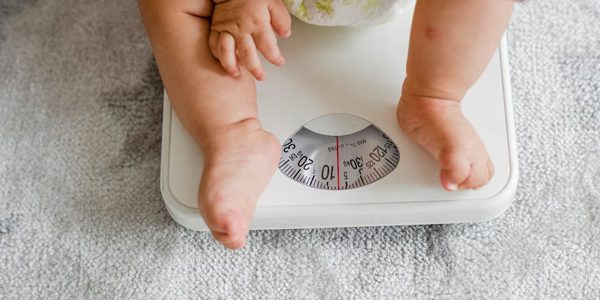Baby weight and height become a primary concern for every parent over time. Some babies have exponential growth whereas others undergo a slow process of achieving the average baby weight standards. Interestingly, the world’s smallest surviving baby Kwek Yu Xuan was born around 25 weeks and weighed only 7.5 ounces at birth. The average weight of full-term babies is 7 pounds, 5 ounces. However, babies come in different sizes and a percentage of healthy babies are born under or over average weight. It is essential to keep track of newborn weight to know your baby’s progress.
Baby Weight: An Important Indicator of Growth and Development
A healthy full-term baby weighs anywhere from 5 pounds 11 ounces to 8 pounds 6 ounces. Lower birth weight is anywhere less than 5 pounds and 8 ounces at full term. And larger than average weight is over 8 pounds and 13 ounces. Your pediatrician will monitor the weight, height, and head circumference at every appointment to determine the growth and development. How often should you take your child to your pediatrician depends on the average weight gain.
Weight Gain and Loss During the First Two Weeks of Life
You may notice a slight weight loss during the first few days. On average, breast-fed babies lose up to 10% of their body weight and bottle-fed babies lose up to 5%. Within two weeks, most newborns regain all the weight they lost and return to birth weight.
Average Baby Weight Chart
You may use the following average baby weight chart for children in the U.S. up to 2 years old.
| Age | 50th percentile weight for boy babies | 50th percentile weight for girl babies |
| Birth | 7.8 lbs. (3.5 kg) | 7.5 lbs. (3.4 kg) |
| 0.5 months | 8.8 lbs. (4.0 kg) | 8.4 lbs. (3.8 kg) |
| 1.5 months | 10.8 lbs. (4.9 kg) | 9.9 lbs. (4.5 kg) |
| 2.5 months | 12.6 lbs. (5.7 kg) | 11.5 lbs. (5.2 kg) |
| 3.5 months | 14.1 lbs. (6.4 kg) | 13 lbs. (5.9 kg) |
| 4.5 months | 15.4 lbs. (7.0 kg) | 14.1 lbs. (6.4 kg) |
| 5.5 months | 16.8 lbs. (7.6 kg) | 15.4 lbs. (7.0 kg) |
| 6.5 months | 18 lbs. (8.2 kg) | 16.5 lbs. (7.5 kg) |
| 7.5 months | 19 lbs. (8.6 kg) | 17.4 lbs. (7.9 kg) |
| 8.5 months | 20.1 lbs. (9.1 kg) | 18.3 lbs. (8.3 kg) |
| 9.5 months | 20.9 lbs. (9.5 kg) | 19.2 lbs. (8.7 kg) |
| 10.5 months | 21.6 lbs. (9.8 kg) | 19.8 lbs. (9.0 kg) |
| 11.5 months | 22.5 lbs. (10.2 kg) | 20.7 lbs. (9.4 kg) |
| 12.5 months | 23.1 lbs. (10.5 kg) | 21.4 lbs. (9.7 kg) |
Table derived from WHO Average baby weight chart.
What Does Weight Percentile Mean?
Pediatricians use the graph (based on the table) to mark weight, height, and head circumference in terms of percentile. For example, if your baby’s weight is in the 25th percentile, it means 75% of babies in the same age group weigh more than your baby and 25% weigh less. However, this is not an indication of being underweight or overweight. It also doesn’t mean there is anything wrong with the baby. Doctors follow the growth graph to ensure your baby doesn’t drop into the lower percentile over time which could be a sign of failure to thrive. On the other hand, jumping to a higher percentile indicates a growth spurt.
What are the Factors that Affect the Birth Weight of a Baby?
1. Prematurity
Premature babies are smaller than babies born past their due date.
2. Smoking
Mothers who smoke during pregnancy have smaller babies.
3. Gestational Diabetes
Diabetes during pregnancy can result in larger-than-average baby weight.
4. Nutrition
Poor nutrition intake during pregnancy results in smaller babies whereas excessive weight gain can lead to a larger baby.
5. Family History
Some babies are born smaller or larger due to family history.
6. Gender
Newborn girls weigh a little less than boys.
7. Multiple Pregnancy
A single baby will have a good birth weight compared to twin or triplets.
8. Breastfeeding
Breastfed babies gain weight and grow faster than formula-fed babies during the first 6 months of birth.
9. Medical Conditions
Babies born with underlying health issues can gain weight more slowly than healthy babies.
10. Various Other Reasons
In some cases, growth rate of babies is very slow due to lack of sleep, activity, or other uncommon reasons. It shouldn’t be a cause of concern unless there’s something wrong with the baby.
Babies are different and it is important to realize that not all babies grow in the same pattern. Do not always compare the growth of your child with other children. Breastfeeding and allowing toddlers to try new food can have an impact on their weight gain. Though the average baby weight chart is recommended by WHO and CDC, it is important to consult a pediatrician if you have any concerns about the baby’s wellbeing.




















